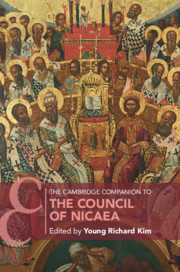Book contents
- The Cambridge Companion to the Council of Nicaea
- Cambridge Companions to Religion
- The Cambridge Companion to the Council of Nicaea
- Copyright page
- Dedication
- Contents
- Figures
- Contributors
- Acknowledgements
- Abbreviations
- 1 Introduction
- Part I Contexts
- 2 Imperial Fathers and Their Sons
- 3 Arius and Arianism
- Part II The Council
- Part III Outcomes
- Part IV The Aftermath
- Part V The Long Reception
- Appendices
- Bibliography
- Index
- References
3 - Arius and Arianism
The Origins of the Alexandrian Controversy
from Part I - Contexts
Published online by Cambridge University Press: 17 December 2020
- The Cambridge Companion to the Council of Nicaea
- Cambridge Companions to Religion
- The Cambridge Companion to the Council of Nicaea
- Copyright page
- Dedication
- Contents
- Figures
- Contributors
- Acknowledgements
- Abbreviations
- 1 Introduction
- Part I Contexts
- 2 Imperial Fathers and Their Sons
- 3 Arius and Arianism
- Part II The Council
- Part III Outcomes
- Part IV The Aftermath
- Part V The Long Reception
- Appendices
- Bibliography
- Index
- References
Summary
The bitter division in Alexandria that led to the Council of Nicaea began as a theological dispute between Alexander, the bishop of Alexandria, and a significant number of his clergy, including a presbyter Arius, and quickly overflowed into a feud among eastern bishops. “Arianism” was assumed by scholars and theologians to be a coherent set of heretical teachings embraced by a succession of followers. Historians have now identified sets of alliances rather than genealogies as well as the polemical construction of “Arianism” by Athanasius and Marcellus. This separation of Arius from later “Arianism,” together with the continuing lack of consensus with regard to theological or philosophical genealogies as the source of his thought, encourages another look at the particular social and religious context of the initial local controversy. The central issues of monotheism, apophatic theology, incarnation, and changeability in fact map over traditional Christian apologetic theology and the literary and ecclesiastical legacies of the Great Persecution. Arius’s insistence on divine monotheism and transcendence together with his defense of a “living image” may echo the contemporary arguments with Celsus and Porphyry in Eusebius and Athanasius as well as a refutation of polytheism.
- Type
- Chapter
- Information
- The Cambridge Companion to the Council of Nicaea , pp. 43 - 62Publisher: Cambridge University PressPrint publication year: 2021
References
Select References
- 2
- Cited by

